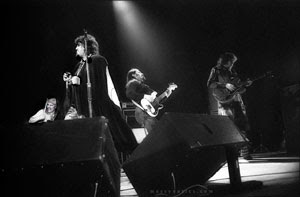|
|
|
Before recording Safe As Milk, the band had previously released a couple of singles through A&M Records, and it was to this company that the group first proposed their debut album in 1966. They presented the label with a set of heavily R&B-influenced demos, which the label apparently felt were too unconventional, and A&M decided to drop the band. (Van Vliet would later claim the label dropped them after hearing the song "Electricity" and declaring it "too negative." This is very probably untrue, since the song had not been demoed at the time.) The conversation between Vliet & Zappa on "The Birth Of Captain Beefheart" (Mystery Disc CD) reveals that A&M's Jerry Moss thought the content too risque for his daughter's ears. This, plus Leonard Grant's severance as manager, added to the discontent. The band instead turned to Bob Krasnow, who was then working for Kama Sutra Records; he recruited them to record for the company's new subsidiary label, Buddah En 1978 se publica Electricity finalmente como sencillo como lado B de Sure 'Nuff 'N Yes I Do |
|
|
 |
| Duración: | 03:07 |
| Año: | 1967 |
| Formato: | 7" |
| A la venta: | 01/09/1967 |
| Lado B: | Sure 'Nuff 'N Yes I Do |
| Disquera: | Buddha Records |
|
|
|
Alex St. Clair Snouffer – guitar, bass, background vocals Jerry Handley – bass, background vocals John French – drums, background vocals Ry Cooder – guitar, slide guitar, bass Samuel Hoffman - theremin Milt Holland – log drum, tambourine Taj Mahal – tambourine |
|
|
|
|
|
|
|
Electricity
|
Electricidad
|
|
Singin through you to me; thunderbolts caught easily Shouts the truth peacefully Eeeeeee-lec-tri-ci-teeeeeeee High voltage man kids his night to bring the light to those who need to hide their shadow deep Though it's too bright find the light and know that friends don't mind just how you grow midnight cowboy stains in black reads dark roads without a map To free-seeking electricity Lighthouse beacon straight ahead straight ahead across black seas to bring Seeking eeee-lec-tri-ci-teeeee High voltage man kisses night to bring the light to those who need to hide their shadow-deed hide their shadow-deed Seek electricity……….. |
|
|
|
|
After fulfilling their deal for two singles the band presented demos to A&M during 1966 for what would become the Safe As Milk album. A&M's Jerry Moss reportedly described this new direction as "too negative" and dropped the band from the label, although still under contract. Much of the demo recording was accomplished at Art Laboe's Original Sound Studio, then with Gary Marker on the controls at Sunset Sound on 8-track. By the end of 1966 they were signed to Buddah Records and much of the demo work was transferred to 4-track, at the behest of Krasnow and Perry, in the RCA Studio in Hollywood, where the recording was finalized. Tracks that were originally laid down in the demo by Doug Moon are therefore taken up by Cooder's work in the release, as Moon had departed over 'musical differences' at this juncture. Drummer John French had now joined the group and it would later (notably on Trout Mask Replica) be his patience that was required to transcribe Van Vliet's creative ideas (often expressed by whistling or banging on the piano) into musical form for the other group members. On French's departure this role was taken over by Bill Harkleroad for Lick My Decals Off, Baby. Many of the lyrics on the Safe As Milk album were written by Van Vliet in collaboration with the writer Herb Bermann, who befriended Van Vliet after seeing him perform at a bar-gig in Lancaster in 1966. The song "Electricity" was a poem written by Bermann, who gave Van Vliet permission to adapt it to music. While Safe as Milk mostly conveyed a blues–rock sound, songs such as "Electricity" illustrated the band's unconventional instrumentation and Van Vliet's unusual vocals, that guitarist Doug Moon described as "hinting of things to come". Much of the Safe As Milk material was honed and arranged by the arrival of 20-year–old guitar prodigy Ry Cooder, who had been brought into the group after much pressure from Vliet. The band began recording in spring 1967, with Richard Perry cutting his teeth in his first job as producer. The album was released in September 1967. Richie Unterberger of Allmusic called the album "blues–rock gone slightly askew, with jagged, fractured rhythms, soulful, twisting vocals from Van Vliet, and more doo wop, soul, straight blues, and folk–rock influences than he would employ on his more avant garde outings". Safe as Milk is the debut album by Captain Beefheart & his Magic Band, originally released in 1967. It is a heavily blues-influenced work, but also hints at many of the features—such as surreal lyrics and odd time signatures—that would later become trademarks of Beefheart's music. The album is also notable for the involvement of a 20-year-old Ry Cooder, who plays guitar and wrote some of the arrangements. |
|
|
|
Sonic Youth
|



